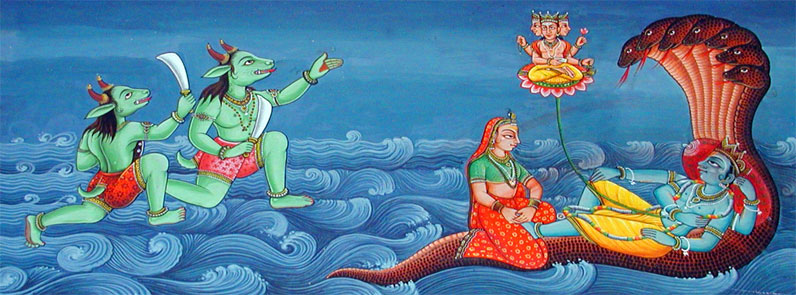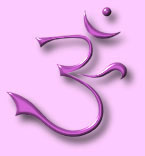 |
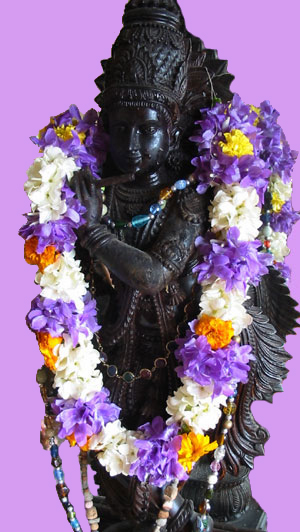 Vanamali Krishna |
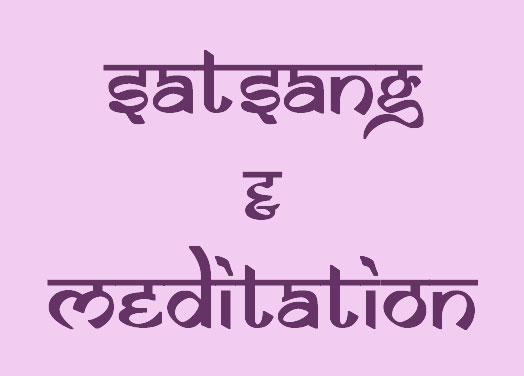 |
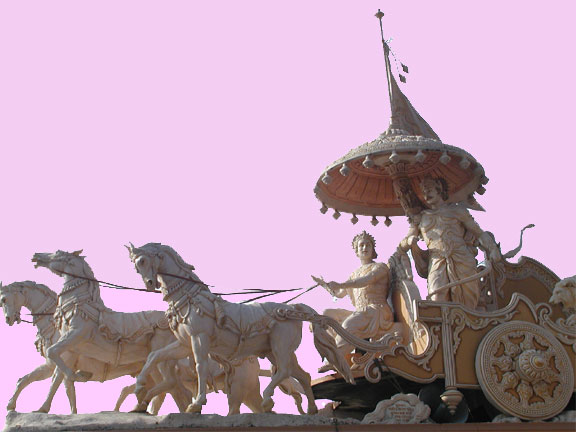 |
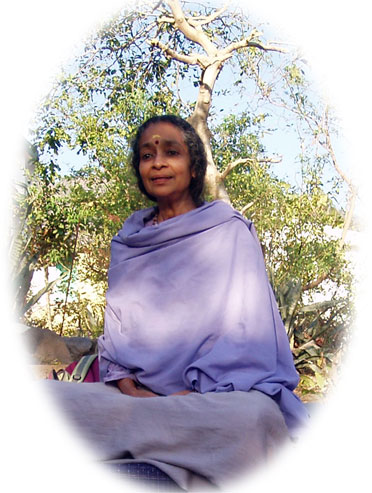 "If you want to overcome duality, accept life as it is... go beyond the attachment to both joy and sorrow." |
|
Satsang, Meditation & Bhajans 6 to 8pm daily... Welcome Please call 243-1316 |
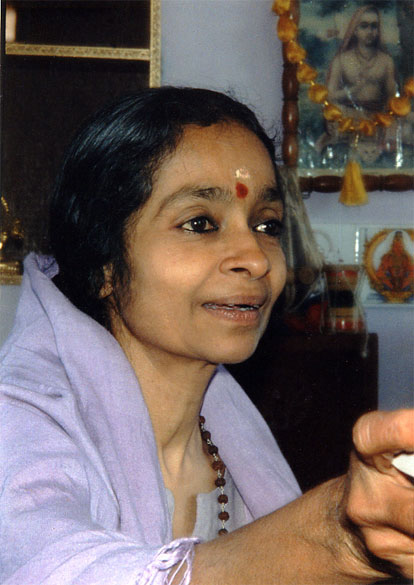 "The purpose of hatha yoga is not to make a perfect body but to enable the body (through purification) to become a vessel for perfection." |
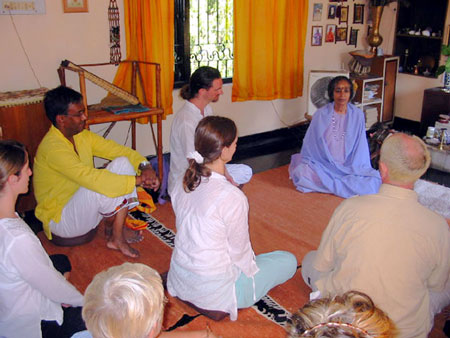 "The goal of life is the liberation of the small self from its unbearable limitations. Hinduism is a goal oriented religion and thus it offers many paths towards the goal. To limit a person to just one path and one way is itself a terrible restraint since everyone is born with different characteristics and different interests." |
 Meditation in Daily Life Chapter 3,4 and 5 of the Gita deal exhaustively with Karma yoga. However we find that even in the 6th chapter the Lord starts by reiterating what has already been said. “Anashrita karmaphalam … He who performs his swadharma without any dependence “anashrita” on the fruits of his action, he is both the karma yogi and the karma sannyasin. Meaning to say one who dedicates himself to perform the bounden duties of his life with no dependence of any type on their results is both a yogi and a sannyasi. A man works for a company without bothering about the salary. What sort of a man is this? Then the question arises “does he have any other source of income.? Perhaps he has a private income but even so since he is working for a private company he must have some desire for the salary. If not why does he work? This particular verse actually gives the meaning of the word “sarva sankalpa sannyasi” - one who has given up all motivated actions. This is a phrase which Lord Krishna has used many times in the Gita and only the one who has understood this phrase can be said to have mastered the Gita. A sankalpa is the motive which makes us undertake any action. When we do a puja in a temple, the pujari asks us to touch the plate containing flowers and make a sankalpa which he normally rattles off with the usual requirements of every human - health, wealth, long life etc. But we can also make our special sankalpas like we want a husband for our child, a promotion for the husband etc. In any action also we make a sankalpa. Nobody does any action for no reason. In fact only idiots or children will do this. So does the Lord want us to become like this? 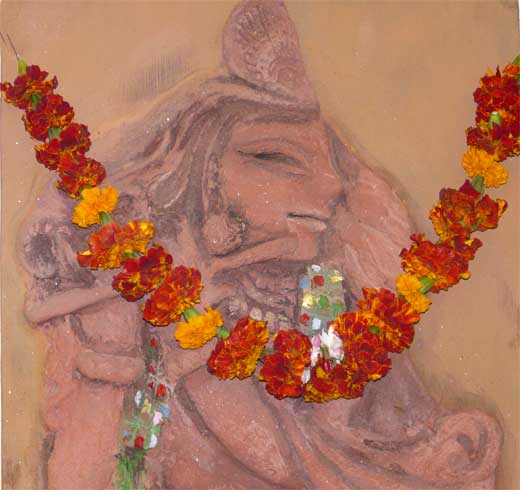 If we go through the karma yoga of the gita as I'm sure all of you must have done many times you would have realized that the Lord is always asking Arjuna to have total dependence on Him alone. If we have total dependence on him, we must have total faith that whatever he gives us will be for our good. This is known as “prasada buddhi” When we take Prasad from the temple we never inquire if it has been made in a clean fashion. “have the bananas been washed properly etc. We accept everything as Prasad and eat it without any question. This is the meaning of the sarvasankalpa sannyasi and anashrita karma phalum.” The man has been put into a certain type of work which he accepts as his duty. After that he has no more worries and he does what is expected of him without having an eye for the fruits alone. This is because he has utter faith that His Lord will not desert him and one day or other he will get his just deserts. This is the type of utter and absolute faith that the Lord demands in all chapters and especially in this one. The meditation part is actually only a corollary. He is indeed like the child who runs about and plays with no fear for he knows that his mother is close by and will take care of him. He does not have to bother about his food and whether his things will be taken care of. He knows fully that all his needs will be taken care of by his mother. This is the perfect state of the yogi who has no cares in the world, who has no dependence on the fruit of his action, who has utter faith in his mother. This is the type of yoga advocated by Krishna. Even though people sometimes call this chapter “Dhyana Yoga” the fact is that there are only 5 verses which deal with classical meditation. There are many other books which deal with this and thus Krishna gives only a few straightforward dos and don'ts about this . In fact you will find that the Gita does not emphasize any sort of external yogas or asanas or any of the other type of sadhanas which might appear great and glorious and which are often done for the fruits alone. The yogi's entire dependence should be on god alone and he doesn't care if the world applauds him or rejects him. This is the greatest sign of the yogi which Krishna expands upon in the 6th chapter. Krishna's only desire is to make everyone a yogi of the type which he thinks is the greatest. Such a yogi is not dependent on the world for his livelihood and therefore he does not care what the world gives him or doesn't give him. He has gone beyond the dualites of the world. As far as his body is concerned he is impervious to heat and cold. Mentally he cares not for either praise or blame and intellectually he is above honour or dishonor. In his eyes everyone is the same. He does not discriminate between different types of people and classify them as friends, relations, neutrals or foes. 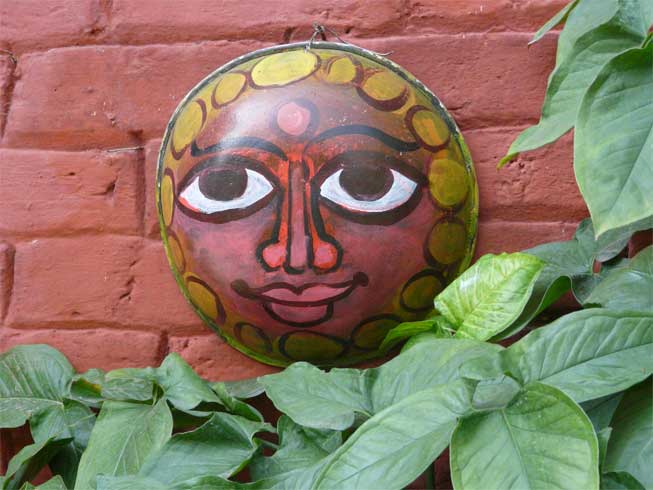 According to Krishna, the supreme yogi is the one who regards all beings (not just all people) as his equals and who considers their pain and pleasure on par with him own. Such a state is only possible for one who has trained himself to see god in everything. Without this training such a state would be impossible. One who feels this would not be able even to contemplate eating a chicken or goat since he would immediately feel the pain of that creature. How is it possible for an ordinary man to attain this state. First and foremost it is through conquest of the lower self. This lower self can be called the personality while the higher self can be called the Person. You must all be familiar with what he has told Arjuna in the 2nd chapter that the personality is something which has been superimposed on the Person. The Person or the atman or the higher self is our true reality and our personality has been superimposed on it so that we think that we are a human being, an Indian, 5 ft. 4 ins. High, with a brown complexion and a degree in medicine or a wealthy business man with 3 children and a beautiful wife and many other things, living in KL and many other things. Here we are describing our lower self which is always wanting to tie us down to this little place in space which we are occupying for a short time. The higher self however is always encouraging us to think of ourselves as universal beings unbound by space or time. Most people succumb to the lures of their lower self and the call of the higher becomes progressively quieter until at last by the end of our time on this earth this voice can hardly be heard. Hence he says our own self is both our enemy and our friend. If we listen to the call of the higher self we can certainly pull ourselves out of our own egoistic cocoon and become the type of yogi which Krishna is talking about. The Upanishad example of the 2 birds on a tree…. However even though we have read this chapter a hundred times true message has escaped us. Krishna is not giving us a talk on meditation. Only five verses are given with instructions about the usual meditation which is taught by so many gurus. Here He is giving us a portrait of an enlightened man. Such a yogi may or may not have attained this state by sitting in a lonely place with his body, head and neck in a straight line and his gaze fixed on the tip of his nose and concentrating on the self alone. If he has practiced this type of classical meditation well and good but in the very next verses he goes back to his original point which he has mentioned from the beginning. The yogi should not be judged by his overt actions. Some yogis may go on a forty one day fast, some may have given up sleep altogether, some may be practicing yogasanas and meditation for 20 hours in a day. BUT these are not the hallmarks of a yogi. In fact Krishna advocates the via media in all activities as did the Buddha. Yoga is not for one who eats too much or eats too little, or one who sleeps too much or too little. All these things are in the realm of the material world and here moderation is the thing to be followed. Eating and sleeping and relaxing are all requirements of the body and thus they have all to be given due consideration and their proportionate places in our lives. We need not go overboard for any of these. What we should guard against is the nature of the mind to grab and keep everything as belonging to oneself. The mind should be taught to constantly engage itself in thinking of God alone. The mind of such a yogi remains motionless as the flame in a windless place. This does not mean that the yogi should only sit in a windless place. Wherever the body of this yogi goes matters little. What is important is the state of his mind. He who worships god as the indweller in all beings always abides in Him since he sees him everywhere. “Sarvata varthamanobhi, sa yogi mayi vartate.” Physically he can go anywhere and do anything but actually he abides in me.” 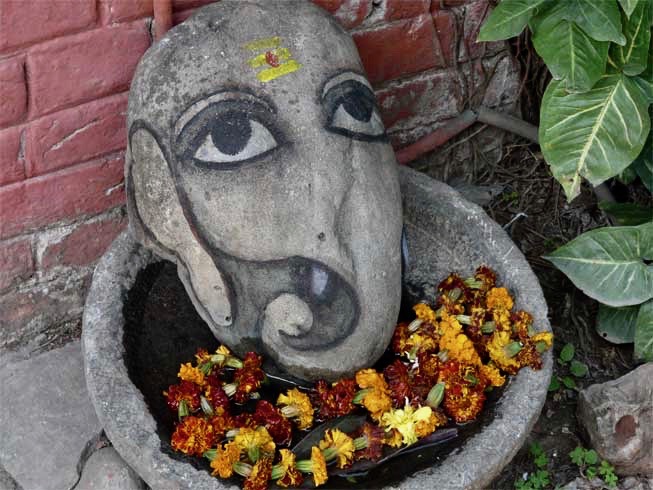 This is the only way that we can practice this yoga of self discipline which the Lord taught Arjuna. We talk glibly of thinking of god all the time. How is this possible when the mind is constantly thinking simultaneously of a thousand things. Again and again Krishna reiterates, One who see me everywhere and all beings as existing in me is never parted from me and I am never separated from him! Think of the bliss the lover gets from being in the company of his beloved all the time. (Of course this is only in the courting period. After marriage you often hear the woman say, I dread the time when he will retire and spend the whole day here. It would drive me crazy) Anyway as I said the lover grudges every moment spent away from his beloved. So think of the joy of this yogi who is never separated from the cosmic beloved. Who see him in every flower, in every face, in every tree, in every mosquito, in every murderer! Naturally such a yogi experiences the exceeding bliss of contact with the Brahman. Brahmanasamsparsham atyantam sukham ashnute. Supreme bliss is attained by him for he is ever in the company of his beloved. No greater gain can be imagined in which the greatest sorrow will not affect. “Yam labdwa chabharam labham manyate chatikam tata. Yasmin sthito na dukhena gurunabhi vichalyathe. Another of the great sayings of Krishna in this chapter is this. The first marriage we make in this earthly world is with sorrow and here Krishna says that such a yogi as he has been describing will be able to divorce sorrow once and for all. Again and again the Lord reiterates sankalpa prabhvan kaaman thyaktwa. All scheming and plotting for the future should be totally avoided at all cost. After all how much of the future can you see. So why do you bother about it? Your duty is only to think of him and how can I think of him constantly, he has said, “One who sees everything as Him and sees Him in everything such a yogi is never parted from Him.” If you stick to this duty of yours then the ball is in his court and he will take care of both your fortune and its maintenance as He will say in chapter 9 “Ananayath. Chintayo” 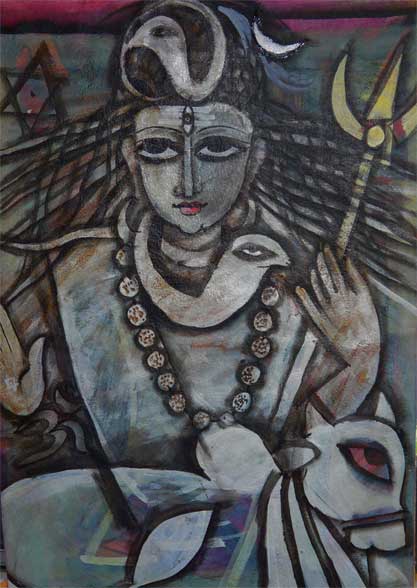 Equality of vision is something which has been stressed in every chapter of the Gita. One who sees everything and everyone with an equal eye. - a clod, a stone and a piece of gold. This does not mean that the yogi is a clod who cannot see the physical differences between things. What it means is that the yogi sees with the inner vision and to Him all these apparently different things are same because the same Lord of the universe is existing in them as in himself. However Arjuna is the normal human being who just cannot grasp this amazing state of living described in this chapter by Krishna. His immediate question is “I doubt if this turbulent mind can ever b controlled enough to be able to practice this yoga of equanimity that you have just described.” Krishna gives a very straightforward answer to this for he realizes that Arjuna has not quite grasped the gist of what he has been saying all along. The two wings of the aspiring mind should be vairagya and abhyasa, One is negative and the other positive. First of all one should try to have detachment and dispassion towards material things and values. It is our values which have to be changed first. We always have time to go for a show or go shopping or do something which our mind likes to do. This is where we try to practice vairagya. Tell ourselves that in the long run these things don't matter. What matters is our attitude to god. He has already said in a previous verse that this yoga should be practiced with determination and without giving way to depression, because he realizes that very often the practicing sadhaka will become depressed by his apparent failure to make any progress so he says we must keep practicing with determination and a cheerful heart for we never know when we might succeed. 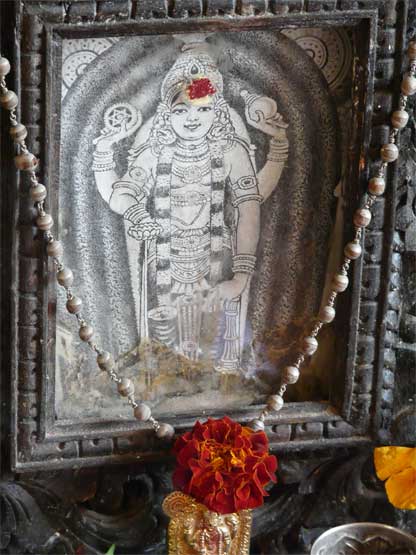 Another beautiful idea of the 6th chapter is brought out by another question by Arjuna. What is the fate of the person who for some reason or other falls from the path of yoga which he has been practicing sincerely but perhaps without perseverance. Does he not fall into the deepest of hells? Krishna gives the very consoling answer that there is never a fall for the yogi. Whatever has been gained in a previous life will remain with him forever and help him in his progress in another life. He will take up the threads of his yoga for he will be irresistibly be drawn to what he was unable to accomplish in a previous life and he will continue with it . “Nahi kalyankrit kaschit durgatim tata gachati. From these facts one can see that Krishna is not really satisfied with just a twenty min or half hour meditation done as a kind of enforced duty with no real inclination or faith. What He asks for is a whole movement of the entire personality towards the highest in him which is the Purushottama. The whole life of the yogi is to be directed towards god. It is not enough to have a half hearted inclination for god. Krishna is a very demanding lover. He is not satisfied with just a few minutes of our time to be spent on him - an hour in a temple or a church. He wants nothing less than a twenty four hour affair with him. The yogi should practice Nitya Yoga or the yoga of constant meditation. Such a yogi meets the divine beloved in everything, in every glance , in every thought. Every breath he takes is part of the cosmic divine breath, every breath he gives out is his small contribution to that divine force. Sitting, sleeping, talking, listening, eating he thinks of nothing but the divine. Yuktahara viharasya. Here the word yukta is normally translated as moderation. Of course this is one of the meanings of the word but there is another meaning to this word which is often used by the Gitacharya.- united. So the yogi should be united with god in all his actions, sleeping, waking, breathing, resting running, talking etc. Such a yogi who is constantly united yukta is indeed the greatest of all yogis. This is the greatest meditation- when the mind is in constant union with him. |
Asangoham "Asangoham, asangoham, asangoham punah punah! Satchidananda roopoham, ahamevahamvyayah: Nitya shudda vimuktoham, nirvikarohm avyayah: Bhoomandandaswaroopoham, ahamevahamavyayah: Nityoyam niravadyoyam nirakarohamachyatha: Paramananda swaroopoham, ahamevahamvyayah: Anatar jyoti bahir jyoti, pratyak jyoti paratparah: Jyoti jyoti ahamswayam jyoti, atma jyoti shivosmyham. Repeat Asangoham..." ˇ "Unattached, unattached, unattached, am I (to the body, mind, intellect, I alone and changeless exist in the form of consciousness and bliss. I am ever pure and free, without change of form and nature. I am ever full- I alone exist changeless. I am eternal and without boundaries, immutable and unshakable, I alone exist I changeless in the form of consciousness and bliss. Effulgence am I both inside and outside, The light which is apparent as well as transcendent. Light of all lights, self effulgent, the light of the atman, Filled with auspiciousness am I"ˇ |
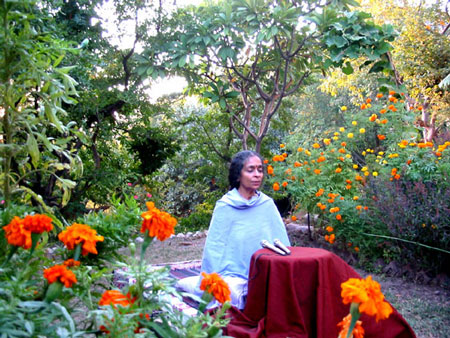 "Do not to belead astray by the words of the scrptures and theologians... do not get caught up in beliefs, which only point to the truth and are not the truth... listen to the sound of the Ganga or the song of the birds...." 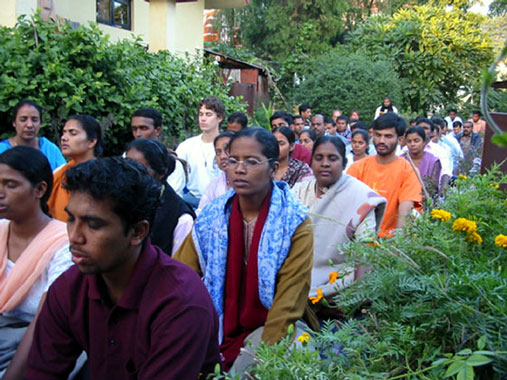 Catholic Seminarians at Vanamali Ashram Listening to the sound of the "Inner Ganga." |
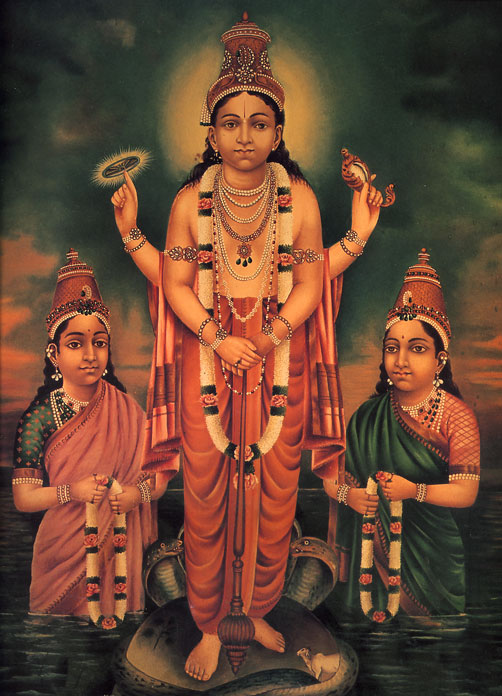 Evening Arati Jaya Jagadeesha Hare Sa shanka chakram sa kireeda kundalam, Sa peetha vastram sarasiruhekshanam, Sa haara vaksha sthana koustubham sriyam, Namaami Vishnum shirasa chaturbhujam Aum Jaya jagadeesha hare, Swami jaya jagadeesha hare, Bhakta janonke sankata, daasa janonke sankata, Kshaname doora kare, Aum Jaya jagadeesha hare. 1. Jo dyavai phala pawai, Dhukha vinase manaka, Swami dhuka vinase manaka, Sukha sampati kara awai, kashta mittai tanaka (Aum Jaya jagadeesha hare) 2 Mata pita tum mere sharana kahun me kisakee, Swami sharana. Kahun me kisakee, Tum bina aura na duja (2) Asha karun me jisakee. (Aum jaya..) 3 Tum poornana Paramatma, tum antarayami Swami tum antarayami, Paarabrahma parameshwara (2) Tum sabke swami (Aum jaya…) 4 Tum karuna ke sagara, tum palana karta, Swami tum palana karta. Me sewaka tum swami,(2) Kripa karo bharta (Aum Jaya…) 5. Tum ho ek agochara, sabake prana pati, Swami sab ke prana pati, Kise vidhi milun daya maya (2) Me tumako kumati (Aum jaya…) 6. Deena bhandu dukkha harta, tum rakshaka mere, Swami tum rakshaka mere, Apane hath uthao, (2) sharana padam tere, (Aum jaya…) 7. Vishaya vikara mittao, papa haro deva, Swami paap haro deva, Sraddha bhakti badao (2) Santanaki sewa (Aum Jaya …) 8 Tan man dhan sab tera, Sab kuch hi tera Swami sab kuch hi tera Tera tujhuko arpana Tera tujhuko arpana Kya laaye mera (aum jaya..) Hail Master! Lord of the Universe! Who removes in a moment the sorrows of his devotees And the suffering of the poor, Glory to the Lord of the universe! 1. The sorrows of one who meditates on thee are removed, He also gets the fruit of contemplation, Happiness and wealth come to his home And physical ailments are removed. 2. I take refuge in Thee who are both my mother and father, O Lord! in whom else can I take refuge There is none other than you in whom I can put my hopes, Glory to the Lord of the Universe. 3. You are the perfect Soul Supreme, Dweller in the hearts of all, You are both the Supreme Lord and Master, Lord of everyone’s life, Glory to the Lord of the Universe. 4. O thou ocean of compassion, Nourisher of all You are my master, I am thy servant. Grant me your grace, glory to the Lord of the universe. 5. You are the life breath of everyone, Way beyond the reach of the mind and senses, O gracious One! How can I ever find you? Glory to the Lord of the universe. 6. Friend of the distressed, destroyer of sorrow! You alone can save me, Extend thy helping hand to me,. Who am lying helpless at thy threshold. Glory to the Lord of the universe. 7. Wipe out all my worldly faults Forgive my sins, And increase my faith and devotion, And give me an opportunity to serve the saints. Aum Glory to the Lord of the Universe. 8. My body, mind and wealth belong to you, Everything of mine belongs to you, I can only offer you what is yours already, What do I possess which is my own? Repeat Hail Master! Lord of the universe 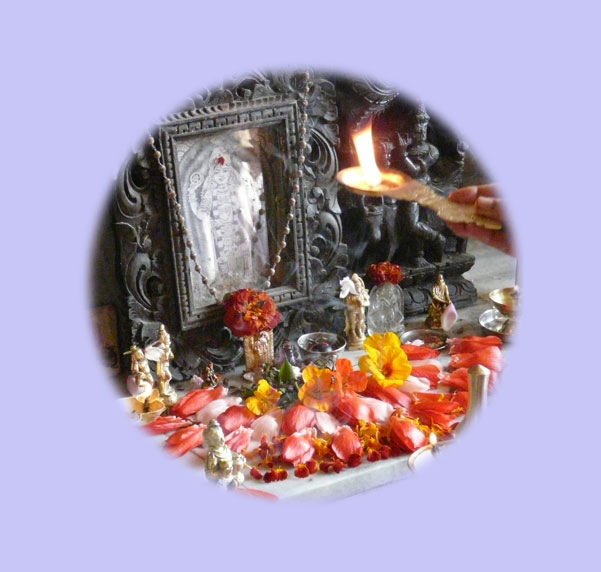 Aarati Ramakrishna Mukunda Madhava, Vaasudeva Janardana, Devaki sutha dehi me tava Pada bhaktim achanchalam (repeat) O Rama, Krishna, Mukunda, Madhava, Vaasudeva, Janardana,(All names of Krishna) O son of Devaki! grant that I may have unfaltering devotion to thy feet Arati kunja vihari ki Sri Giridara Krishna muraree ki, Gale me vyjayanthi mala, Vanamala. Bhajave murali madhura bala, aha bala. Nandaki nanda. Sri ananda kanda Mohana vriji chanda, Radhika ramana vihari ki Sri Giridara Krishna muraree ki..(repeat) I do arati to Lord Krishna who sports in the thickets, Wearing a garland of wild flowers, And playing his flute. He is the darling of Nanda, A bundle of bliss, The light of Vrindavan And the delight of Radha. Bhajan for dancing, Govinda Jai Jai, Gopala Jai Jai Radha ramana Hari govinda Jai Jai (repeat) Hail to Govinda, the delight of Radha. Hari Aum Tat Sat  Vanamali Bhajans 1. Ganesha sharanam, sharanam Ganesha Ganesha sharanam, sharanam Ganesha, Ganesha sharanam sharanam Ganesha, Ganesha sharanam sharanam Ganesha (repeat) 2. He Nanda Nanda Gopala, Ananda Nanda Gopala, He Nanda Nanda Gopala, Ananda Nanda Gopala, He Nanda Nanda, ananda Nanda, Yadu Nanda Nanda Gopala. 3. Chitta chora Yasodaki Baal Navaneeta chora Gopaal, Gopaal, Gopaal, Gopaal, Go-vardhanadara Gopaal 4. Govinda Jai Jai, Gopaala Jai Jai, Radha ramana Hari, Govinda Jai Jai (repeat) 5. Jaya Naarayana Hari Aum, Hari Aum, Hari Aum. Bhaja Naarayana Hari Aum Hari Aum Hari Aum. Shantaakaara Bhujanga shayana Padmanaabha Hari Aum Jaya Naarayana, Hari Aum, Hari Aum, Hari Aum…. 6. Aum Namashivaya, Aum Namashivaya, Aum Namashivaya nama Aum Aum Namashivaya, Aum Maheswaraya, Aum Sadashivaya Nama Aum Shiva Aum, Shiva Aum, Shiva Aum, Shiva Aum. Hara Aum, Hara Aum, Hara Aum, Hara Aum. Bhava Aum, Bhava Aum, Bhava Aum, Bhava Aum Aum Namashivaya …… Aum Namashivaya, Shivaaya nama Aum Aum Namashivaaya, Shivaaya nama Aum Gangajadhadara, Bhavaani Shankara, Kedaarnaatha, namosthute, Chorus. Hari Naarayana, Jaya Naaraayana, Hari Naaraayana, Jaya Naaraayana, Shaantakaara, Nara Naaraayana, Badrinaatha Namosthute Chorus. 7. Radhe Radhe Radhe, Radhe Govinda, Radhe Radhe Radhe Radhe Govinda Radhe Radhe, Radhe, Radhe Govinda, Radhe Govinda, Vrindavana Chanda (repeat) 8. To Thee who stole the butter and milk, To Thee who’s clad in yellow silk, To Thee I give my salutation. To Thee who danced on Kaaliya’s hood, To Thee, the cause of evil and good, To Thee I give my salutations, O Krishna! O Krishna! O Krishna! Thou Lord and God of Vanamaali, Thou savior of Draupadi, Thou Partha’s saarathy, To thee I give my salutation. O Krishna O Krishna O Krishna, To thee only to Thee To thee only to Thee Do I give my salutation, My prostration,, My salutation, My prostration. To thee to thee to thee O Krishna O Krishna O Krishna This is a Vanamali composition 9. Chilanka Ketti odi odi vayo, Ente Thamara Kanna adi adi vayo, Ninte Pinju Padam tedi tedi nangal, Ninde divya Namam paadi paadi vannen. Devaki nandana Radha Jeevana, Keshava Hare Madhava, Putana Vigraha, Papa Vinasaka, Keshava Hare Madhava Gokula Balane Odi vayo, Gopala Balane OdVayo. Kamsa Vimardana, Kaliya Narttana, Keshava Hare Madhava, Asrita Valsala, Aapat Bandhava, Keshava Hare Madhava, Omkara Nadame odi vayo,Ananda Gitame odi vayo. Pandava Rakshka Papa Vinashaka, Keshava Hare Madhava, Arjuna Rakshka, Ajnana Nashaka, Keshava Hare Madhava, Gitamritame odi vayo, Hridayanandame odi vayo. Hari Aum Tat Sat |
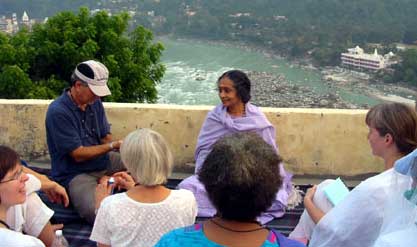 Visitors from Ananda Village with Mataji Overlooking the Ganga |
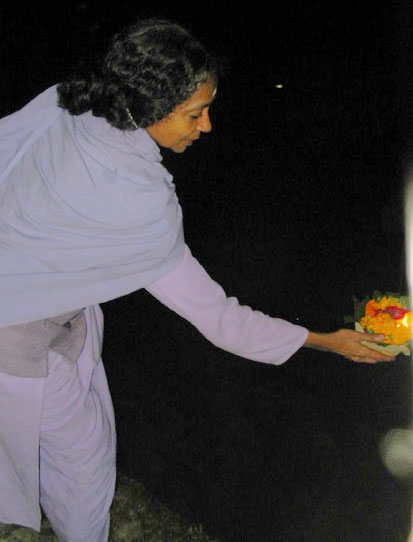 Mataji Vanamali making an offering to the Mother Ganga |
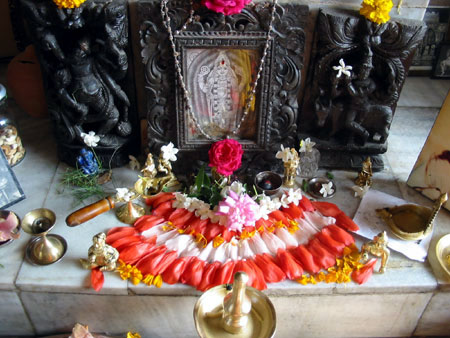 Each morning 1008 flowers are offered to Lord Sri Guruvayoorappan with the chanting of the Vishnusarasranama |
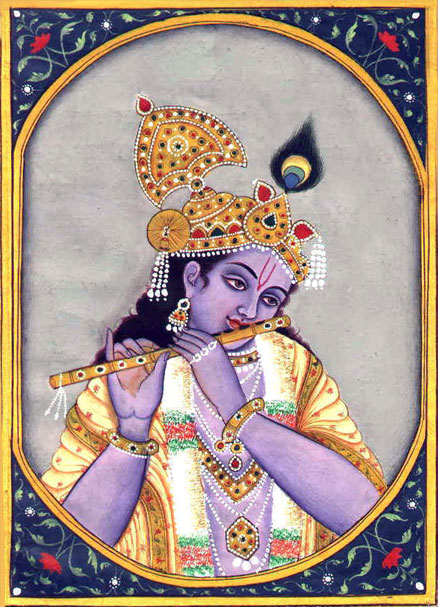 |
| Home |
Ashram Store |
About Vanamali
Ashram |
Miracle at Vanamali | Bhagavad Gita |

|
